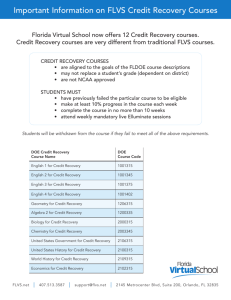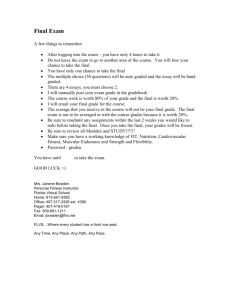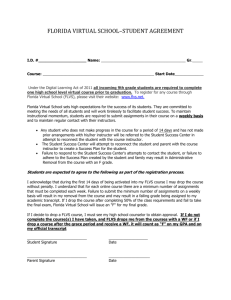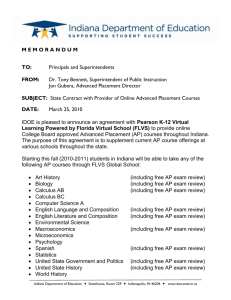FLVS Syllabus
advertisement
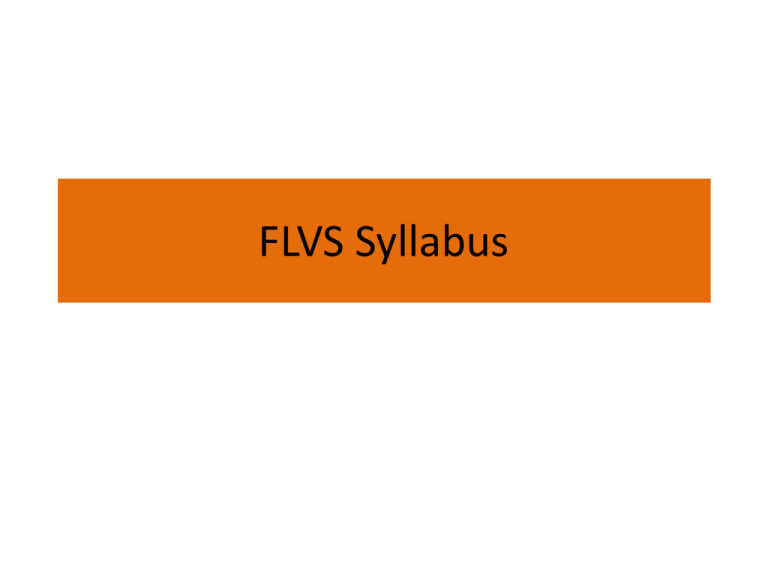
FLVS Syllabus • FLVS: Economics/U.S. Government Facilitator: Mr. Mickens kmickens@dadeschools.net • Economics- The grade 9-12 Economics course consists of the following content area strands: Economics and Geography. The primary content emphasis for this course pertains to the study of the concepts and processes of the national and international economic systems. Content should include, but is not limited to, currency, banking, and monetary policy, the fundamental concepts relevant to the major economic systems, the global market and economy, major economic theories and economists, the role and influence of the government and fiscal policies, economic measurements, tools, and methodology, financial and investment markets, and the business cycle. • United States Government - The grade 9-12 United States Government course consists of the following content area strands: Geography, Civics and Government. The primary content for the course pertains to the study of government institutions and political processes and their historical impact on American society. Content should include, but is not limited to, the functions and purpose of government, the function of the state, the constitutional framework, federalism, separation of powers, functions of the three branches of government at the local, state and national level, and the political decision-making process. • Honors/Advanced courses offer scaffold learning opportunities for students to develop the critical skills of analysis, synthesis, and evaluation in a more rigorous and reflective academic setting. Students are empowered to perform at higher levels as they engage in the following: analyzing historical documents and supplementary readings, working in the context of thematically categorized information, becoming proficient in note-taking, participating in Socratic seminars/discussions, emphasizing free-response and document-based writing, contrasting opposing viewpoints, solving problems, etc. Students will develop and demonstrate their skills through participation in a capstone and/or extended researchbased paper/project (e.g., history fair, participatory citizenship project, mock congressional hearing, projects for competitive evaluation, investment portfolio contests, or other teacher-directed projects). • Mathematics Benchmark Guidance - Social Studies instruction should include opportunities for students to interpret and create representations of historical events and concepts using mathematical tables, charts, and graphs. • Student Expectations • This course requires the same level of commitment from you as a traditional classroom course would. Throughout the course, you are expected to spend approximately 5–7 hours or more per week online on the following activities: • Interactive lessons that include a mixture of instructional videos and tasks • Assignments in which you apply and extend learning in each lesson • Assessments including quizzes, tests, and cumulative exams • Communication Your teacher will communicate with you regularly through discussions, e-mail, chat, and system announcements. Through this communication with your teacher, you will monitor your progress through the course and improve your learning by reviewing material that was challenging for you. You must provide a working contact number for you and your parent, so that your teacher can contact you with the information and resources needed to successfully complete this course. Grading • Your grade will be based on the work you complete online by your FLVS teacher. Your conduct and effort graded will be entered by me. Policy on Academic Honesty: Krop and FLVS expect all members of its community to act with honesty and integrity at all times, especially in their academic coursework. Academic honesty respects the intellectual and creative work of others, flows from dedication to and pride in performing one’s own best work and is essential if true learning is to take place. Examples of academic dishonesty include, but are not limited to, the following: all acts of cheating on assignments or examinations, or facilitating other students’ cheating; plagiarism, fabrication of data, including the use of false citations; and improper use of internet sites and resources. General Classroom Rules & Discipline: I strictly adhere to the standards for behavior (including the dress code) established in the Parent/Student Handbook. The following lists of rules are highlights from the greater list of rules and expectations in the Parent/Student Handbook for which all MDCPS students are responsible. • • • • • • • • • • • • • Be in your assigned seat, in compliance with dress code and ID, and ready to work when the bell rings.*absolutely no talking during the first/last ten (5) minutes of class! Attendance and pertinent information will take place during this time. Raise your hand for permission to speak or to leave your seat. You may not leave the room during class. No hall passes will be given during the first and last 10 minutes of class. Exceptions (which still require instructor's permission): discipline, medical requirements, emergency restroom needs. Do not touch anyone else in class with your hands, feet or any other object. No cursing or profanity including the “N” word will be tolerated. (Automatic referral/detention will be given on the first offense.) Show courtesy and respect to all students, teachers and guests in the classroom. Do not sleep, eat, drink (not even water), or chew gum in class. *unless given permission No cell phones are to be out at any time. * Unless given permission; cell phones will be confiscated and sent to the office. Do not go behind the instructor's desk unless specifically directed to do so by the instructor. Follow instructions the first time they are given. The teacher dismisses the class, not the bell. *Remain seated Follow and adhere to Integrity Guidelines All Students are required to wear headphones while using the computers. Consequences for breaking any of the preceding 10 rules, as well as any of the other rules specified in the Parent/Student Handbook, include the following and depend upon the severity and frequency of the offense, and not necessarily in this order: • • • • • • • Warning/parent phone call Parent / Teacher Conference Teacher Detention – with behavioral essays (5 paragraphs) Wednesdays in 2145/2224 Reduction of Conduct (Citizenship) Grade Referral Saturday School and Suspension for more serious offenses at the administration's discretion. Removal and withdrawal from Florida Virtual • Note: Behavior, conduct, and grades will have an effect on your ability to attend senior activities, such as homecoming dance, senior breakfast, grad-night, prom, and participation in athletics and extracurricular activities. Students who receive detentions or behavioral essays will not be allowed to use computers in class until those consequences are completed. • Classroom Rules Mr. Mickens United States Government/Economics • 1. Students must be on time to class and wearing their school uniform and ID. No ID, no admittance! Pick up a laptop as you enter the class and sit in your assigned seat immediately. Remain in your assign seat at all times • 2. All students must be seated and quiet when the bell rings. Absolutely no talking during the first and last ten (5) minutes of class. All students must have on their earbuds/headphones while working on the computers. • 3. Follow directions the first time they are given. Information will not be repeated a second time. LISTENING is a very important skill that adults need to learn to be successful. Food and water are prohibited in the lab, unless permission is given by the instructor. • 4. ABSOLUTELY no Cursing, inappropriate behavior, vulgar or foul language, including the “N” word, will not be tolerated in this class! *Conduct cuts, detentions, or referrals will be issued. • 5. No hall passes will be issued during the first and last 10 minutes of class. Laptops will be replaced during this time. The teacher dismisses the class, not the bell! (Remain seated) Note: Students will not be allowed to enter the lab, if they are not assigned during that period. No exceptions! • Requirements • • • • • • • • Personal Headphones/earbuds Silence: No talking USB/memory stick/flash drive Silence: Library quiet Personal laptop/tablet (no phones) Silence: Mortuary quiet Paper and pens Mouth muzzle or duct tape
